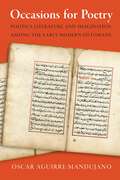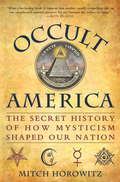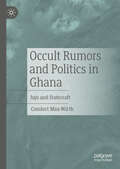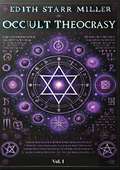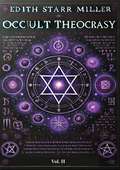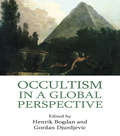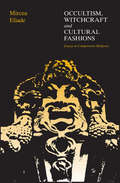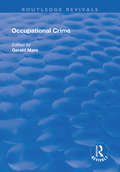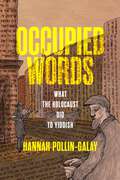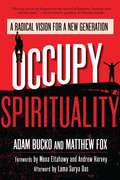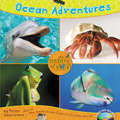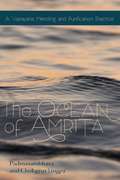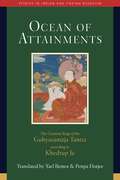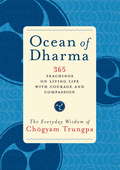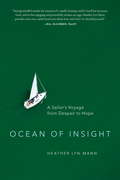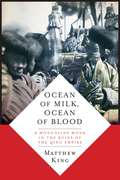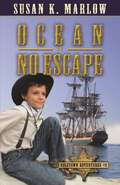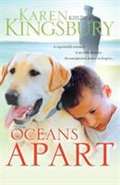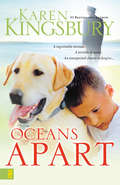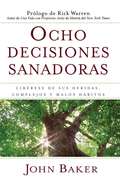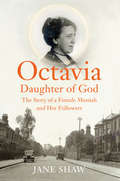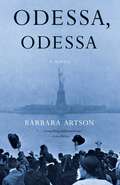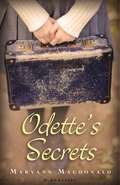- Table View
- List View
Occasions for Poetry: Politics, Literature, and Imagination Among the Early Modern Ottomans
by Oscar Aguirre-MandujanoHow Turkish poetry became the preferred mode for communicating, debating, and shaping political and social experience in the early Ottoman EmpireOccasions for Poetry is a history of how Turkish poetry became the preferred mode for communicating, debating, and shaping political and social experience in the early Ottoman Empire. After the conquest of Constantinople in 1453, Ottoman elites at the imperial court turned to poetry to craft distinctive modes of expression in order to articulate their own place within the Ottoman sultanate.Placing Ottoman court poetry in its social and historical context, Oscar Aguirre-Mandujano argues that poetry functioned as a political act. Aguirre-Mandujano examines the occasions that compelled the Ottomans to compose poetry, to present it to their superiors, to share it with their peers, and to spend considerable efforts and time to make poetry often and to make it well. He explores how scholars and bureaucrats interacted with each other through poetic imagery, revealing how literary language affected bureaucratic practice. Poetry was not only an artistic activity, but also a means to advance or save one’s own political or bureaucratic career.For the Ottoman elite, poetry was more than a creative activity or a flattering description of Ottoman power and expansion; it was a vehicle to shape and mold their social reality. The language and genres created and used by these early modern Ottomans would define both a literary tradition and the shape of imperial politics and power for almost six centuries, until the end of the empire in the twentieth century.
Occult America: The Secret History of How Mysticism Shaped Our Nation
by Mitch HorowitzHorowitz is the editor in chief of Tarcher/Penguin and a voice for occult and esoteric ideas based in New York City. He describes how mystical and occult ideas and practices have been present in North America since nearly the beginning of European settlement, and have often and constantly been crucial in the development of the US into what it is today. He recounts the history in a series of stories, generally chronological, that include the ouija and the selling of spiritualism the mail-order prophet, the rise of magic in Afro-America, the return of the Secret Teachings, politics and the occult during the New Deal, secrets for sale, and Aquarius rising at the dawn of the New Age. Annotation ©2009 Book News, Inc. , Portland, OR (booknews. com)
Occult Rumors and Politics in Ghana: Juju and Statecraft
by Comfort Max-WirthThis book addresses the phenomenon of rumors about the occult in contemporary Ghanaian politics. Drawing on data from fieldwork interviews and analysis of case studies, it examines: why political rumors in Ghana often focus on the occult; what political-occult rumors accomplish and for whom; the ways in which Ghanaian politicians use rumors about the occult to gain political advantage; and some of the popular attitudes of the electorate to the rumors. The book demonstrates that political-occult rumors have become important tools in the hands of Ghanaian politicians to gain political advantage over opponents, and the electorate as means to critique the actions and behavior of political actors and the political process, generally. In a nutshell, this book highlights the important role of occult rumors in modern Ghanaian politics, with a particular focus on the period between the late 1970s and present. The main thrust of the argument in this book is that the flourishing of political-occult rumors and the strength of Pentecostalism are related, and that far from being a phenomenon existing on the margins of modern Ghanaian society, the occult is powerful, public and mainstream.
Occult Theocrasy: Vol. 1 (Occult Theocrasy #1)
by Edith Starr MillerOccult Theocrasy by Edith Starr Miller is an ambitious and controversial work that delves into the hidden world of secret societies, occult practices, and their alleged influence on global politics and religion. Originally published in the early 20th century, this book presents a detailed examination of various esoteric organizations and theologies, exploring their origins, rituals, and the role they purportedly play in shaping world events.Miller, a socialite and researcher with a deep interest in the esoteric and the occult, meticulously compiles an extensive array of historical and anecdotal information, tracing the connections between ancient mystery schools, religious movements, and modern secret societies. She argues that many of these organizations have exerted significant influence over political and religious institutions throughout history, often operating behind the scenes to advance specific agendas.Occult Theocrasy covers a wide range of topics, from the origins of Freemasonry and Rosicrucianism to the activities of the Illuminati, the Knights Templar, and other lesser-known groups. Miller explores the symbolism, doctrines, and alleged hidden goals of these societies, presenting her perspective on how they interconnect and impact the broader world.While the book has been the subject of debate and scrutiny, it remains a significant piece of literature for those interested in conspiracy theories, secret societies, and the occult. Miller’s writing reflects the concerns and fears of her time, offering a window into the early 20th-century mindset regarding these mysterious and often misunderstood groups.Occult Theocrasy is essential reading for historians, researchers, and anyone curious about the intersections of power, religion, and the occult. Edith Starr Miller’s work continues to provoke thought and discussion, making it a notable contribution to the literature on secret societies and their place in history.
Occult Theocrasy: Vol. 2 (Occult Theocrasy #2)
by Edith Starr MillerOccult Theocrasy by Edith Starr Miller is an ambitious and controversial work that delves into the hidden world of secret societies, occult practices, and their alleged influence on global politics and religion. Originally published in the early 20th century, this book presents a detailed examination of various esoteric organizations and theologies, exploring their origins, rituals, and the role they purportedly play in shaping world events.Miller, a socialite and researcher with a deep interest in the esoteric and the occult, meticulously compiles an extensive array of historical and anecdotal information, tracing the connections between ancient mystery schools, religious movements, and modern secret societies. She argues that many of these organizations have exerted significant influence over political and religious institutions throughout history, often operating behind the scenes to advance specific agendas.Occult Theocrasy covers a wide range of topics, from the origins of Freemasonry and Rosicrucianism to the activities of the Illuminati, the Knights Templar, and other lesser-known groups. Miller explores the symbolism, doctrines, and alleged hidden goals of these societies, presenting her perspective on how they interconnect and impact the broader world.While the book has been the subject of debate and scrutiny, it remains a significant piece of literature for those interested in conspiracy theories, secret societies, and the occult. Miller’s writing reflects the concerns and fears of her time, offering a window into the early 20th-century mindset regarding these mysterious and often misunderstood groups.Occult Theocrasy is essential reading for historians, researchers, and anyone curious about the intersections of power, religion, and the occult. Edith Starr Miller’s work continues to provoke thought and discussion, making it a notable contribution to the literature on secret societies and their place in history.
Occultism in a Global Perspective: Occultism In A Global Perspective (Approaches To New Religions Ser.)
by Gordan Djurdjevic Henrik BogdanThe study of the ideas and practices associated with occultism is a rapidly growing branch of contemporary scholarship. However, most research has focused on English and French speaking areas and has not addressed the wider spread and significance of occultism. Occultism in a Global Perspective presents a broad international overview. Essays range across the German magical order of the Fraternitas Saturni, esoteric Satanism in Denmark, sexual magic in Colombia and the reception of occultism in modern Turkey, India and the former Yugoslavia. As any other form of cultural practice, the occult is not isolated from its social, discursive, religious, and political environment. By studying occultism in its global context, the book offers insights into the reciprocal relationships that colour and shape regional occultism.
Occultism, Witchcraft, and Cultural Fashions: Essays in Comparative Religion
by Mircea EliadeIn the period domoninated by the triumphs of scientific rationalism, how do we account for the extraordinary success of such occult movements as astrology or the revival of witchcraft? From his perspective as a historian of religions, the eminent scholar Mircea Eliade shows that such popular trends develop from archaic roots and periodically resurface in certain myths, symbols, and rituals. In six lucid essays collected for this volume, Eliade reveals the profound religious significance that lies at the heart of many contemporary cultural vogues. Since all of the essays except the last were originally delivered as lectures, their introductory character and lively oral style make them particularly accessible to the intelligent nonspecialist. Rather than a popularization, Occultism, Witchcraft, and Cultural Fashions is the fulfillment of Eliade's conviction that the history of religions should be read by the widest possible audience.
Occultism, Witchcraft, and Cultural Fashions: Essays in Comparative Religions
by Mircea EliadeIn the period domoninated by the triumphs of scientific rationalism, how do we account for the extraordinary success of such occult movements as astrology or the revival of witchcraft? From his perspective as a historian of religions, the eminent scholar Mircea Eliade shows that such popular trends develop from archaic roots and periodically resurface in certain myths, symbols, and rituals. In six lucid essays collected for this volume, Eliade reveals the profound religious significance that lies at the heart of many contemporary cultural vogues. Since all of the essays except the last were originally delivered as lectures, their introductory character and lively oral style make them particularly accessible to the intelligent nonspecialist. Rather than a popularization, Occultism, Witchcraft, and Cultural Fashions is the fulfillment of Eliade's conviction that the history of religions should be read by the widest possible audience.
Occupational Crime
by Gerald MarsThis title was first publishde in 2001. Occupational crime is found in the whole range of occupations and at all levels. Despite the fact that activities are widespread and well known, the area is blurred by contradictory perceptions, denials and arguments over definition. This volume presents influential essays on the topic.
Occupied Words: What the Holocaust Did to Yiddish (Jewish Culture and Contexts)
by Hannah Pollin-GalayHow Yiddish changed to express and memorialize the trauma of the HolocaustThe Holocaust radically altered the way many East European Jews spoke Yiddish. Finding prewar language incapable of describing the imprisonment, death, and dehumanization of the Shoah, prisoners added or reinvented thousands of Yiddish words and phrases to describe their new reality. These crass, witty, and sometimes beautiful Yiddish words – Khurbn Yiddish, or “Yiddish of the Holocaust” – puzzled and intrigued the East European Jews who were experiencing the metamorphosis of their own tongue in real time. Sensing that Khurbn Yiddish words harbored profound truths about what Jews endured during the Holocaust, some Yiddish speakers threw themselves into compiling dictionaries and glossaries to document and analyze these new words. Others incorporated Khurbn Yiddish into their poetry and prose. In Occupied Words, Hannah Pollin-Galay explores Khurbn Yiddish as a form of Holocaust memory and as a testament to the sensation of speech under genocidal conditions. Occupied Words investigates Khurbn Yiddish through the lenses of cultural history, philology, and literary interpretation. Analyzing fragments of language consciousness left behind from the camps and ghettos alongside the postwar journeys of three intellectuals—Nachman Blumental, Israel Kaplan and Elye Spivak—Pollin-Galay seeks to understand why people chose Yiddish lexicography as a means of witnessing the Holocaust. She then turns to the Khurbn Yiddish words themselves, focusing on terms related to theft, the German-Yiddish encounter and the erotic female body. Here, the author unearths new perspectives on how Jews experienced daily life under Nazi occupation, while raising questions about language and victimhood. Lastly, the book explores how writers turned ghetto and camp slang into art—highlighting the poetry and fiction of K. Tzetnik (Yehiel Di-Nur) and Chava Rosenfarb. Ultimately, Occupied Words speaks to broader debates about cultural genocide, asking how we might rethink the concept of genocide through the framework of language.
Occupy Spirituality: A Radical Vision for a New Generation (Sacred Activism #1)
by Matthew Fox Andrew Harvey Lama Surya Das Adam Bucko Mona EltahawyThe Occupy Wall Street movement and protest movements around the world are evidence of a new era of intergenerational activists seeking deeper spiritual meaning in their quest for peace and justice.This book is a call to action for a new era of spirituality-infused activism. Authors Adam Bucko and Matthew Fox encourage us to use our talents in service of compassion and justice and to move beyond our broken systems--economic, political, educational, and religious--discovering a spirituality that not only helps us to get along, but also encourages us to reevaluate our traditions, transforming them and in the process building a more sacred and just world.Incorporating the words of young activist leaders culled from interviews and surveys, the book provides a framework that is deliberately interfaith and speaks to our profound yearning for a life with spiritual purpose and for a better world. Each chapter is construed as a dialogue between Fox, a 72-year-old theologian, and Bucko, a 37-year-old spiritual activist and mentor to homeless youth. As we listen in on these familiar yet profound conversations, we learn about Fox and Bucko's own spiritual journeys and discover a radical spirituality that is inclusive, democratic, and relevant to the world we live in today.Table of ContentsForeword by Mona EltahawyForeword by Andrew HarveyIntroduction: Invitation to Occupy Your Conscience1. Is It Time to Replace the God of Religion with the God of Life?2. Radical Spirituality for a Radical Generation3. Adam's Story4. Matthew's Story5. What's Your Calling? Are You Living in Service of Compassion and Justice?6. Spiritual Practice: Touch Life and Be Changed by It 7. No Generation Has All the Answers: Elders and Youth Working Together8. Birthing New Economics, New Communities, and New Monasticism Conclusion: Occupy Generation and the Practice of Spiritual Democracy Afterword by Lama Surya DasFrom the Trade Paperback edition.
Ocean Adventures
by Peter SchriemerThese two titles have content based upon and supplementing the lessons about God’s creation that are found on the Nature of God DVD collection by Peter Schriemer. These titles, with facts and photos of Hawaii and the Great Lakes habitats and creatures will enrich the lessons taught by Schriemer or can stand alone as informational and fun resources for young readers and their families. The addition of the DVDs showing clips from the Nature of God DVD collections with each book is sure to be a draw for families that are looking for ways to enrich their children’s knowledge of science and nature as well as show, in a beautiful and visual way, that nature is a wonderful gift from God. A quote: Peter Schriemer focuses on a particular ecosystem in the eco-region, how it is designed to sustain life, what amazing creatures and plants live there, and how the science of the creatures and the habitat show evidence of a creator.
Ocean Of Amrita: A Vajrayana Mending and Purification Practice
by Padmasambhava Guru RinpocheThe main focus of the Ocean of Amrita, a hidden teaching of Padmasambhava, is mending and purifying the vows that one has taken. Just like it is important to wash our clothes regularly to keep them clean and mend them when they are in need of repair; no matter what level of Buddhist practice you might be involved in, it is also important to regularly mend and purify your commitments. It is practically impossible for ordinary people like ourselves to keep any of the three levels of precepts, whether those of individual liberation (pratimoksha), the bodhisattva trainings or the samayas of Vajrayana. The tendency to go against the precepts constantly increases due to strengthening the habit of breaking promises and not sticking to what we have committed ourselves to. Therefore it is absolutely necessary to atone for our failings by regularly doing a mending and purification practice.Within the collection of Chokgyur Lingpa's termas is a cycle known as Tukdrub Barchey Künsel that contains great accomplishment practices (drubchen). The one I am going to discuss here is entitled The Ocean of Amrita (Ngakso Drubchen), the main purpose of which is the mending and purification of one's Vajrayana commitments. The text for this ritual is included in the seventeenth chapter of The Essence Manual of Oral Instructions (Sheldam Nyingjang). During this nine-day ritual one visualizes oneself as Padmasambhava with the wrathful deities inside one's skull and the peaceful deities within one's heart. There are an incredible amount of details to visualize in a great accomplishment practice, but the completion stage is woven into the practice too. However, it is important to keep in mind that the main principle of the ritual is to fully mend and purify our vows and commitments, especially those of Vajrayana. That is the bottom line. Very kindly Padmasambhava designed this practice with people like us in mind, for just by doing this practice we can totally purify and restore all of our Vajrayana commitments.
Ocean of Attainments: The Creation Stage of Guhyasamaja Tantra According to Khedrup Jé
by Yael Bentor and Penpa DorjeeThis commentary on Guhyasamaja tantra is the seminal guide to deity yoga and tantric visualization for the Geluk school of Tibetan Buddhism.Ocean of Attainments was composed by Khedrup Jé Gelek Palsang (1385–1438), one of Tsongkhapa Losang Drakpa&’s most prominent disciples. Its subject is the creation stage, a quintessential Buddhist tantric meditation that together with the completion stage comprises the path of unexcelled tantra. The Guhyasamaja Tantra, referred to as the &“king of all tantras,&” is revered in Tibet, especially by the Geluk school, for its hermeneutic methods, which are in turn applied to other tantras. In the creation stage, meditators visualize themselves as buddhas at the center of the celestial mandala, surrounded in all directions by male and female bodhisattvas and enlightened beings. Since the core of the practice is visualization, this meditation—perhaps more than other meditations—presumes the creative power of the mind. Visualizations form the basis not only of the creation stage and deity yoga but of all tantric practices and rituals, since tantric practice takes place not in mundane existence but in the illusion-like purity of the enlightened view. While the previously published Essence of the Ocean of Attainments is a concise exposition on the practice of the Guhyasamaja sadhana, Ocean of Attainments is much more detailed, providing extensive scriptural citations, clear explanation of the body mandala, arguments on points of contention, reference to other tantric systems, and critiques of misinterpretations. Complemented by the extensive and clear introduction, this volume is a vital contribution to the growing body of scholarship on Guhyasamaja and on Buddhist tantra in general.
Ocean of Dharma: The Everyday Wisdom of Chogyam Trungpa
by Carolyn Rose Gimian Chogyam TrungpaHere is an inspiring collection of short teachings from the writings of the renowned Tibetan meditation master Chögyam Trungpa. Pithy and immediate, these teachings can be contemplated and practiced every day--or any day--of the year. Drawn from a wide variety of sources--including never-before-published writings--Ocean of Dharma addresses a range of topics, including fear and fearlessness, accepting our imperfections, developing confidence, helping others, appreciating our basic goodness, and everyday life as a spiritual path.
Ocean of Insight: A Sailor's Voyage from Despair to Hope
by Heather Lyn MannHeather Lyn Mann was a battle-weary environmental advocate in Madison, Wisconsin, struggling over what to do about climate change when she and her husband decided to explore the Atlantic on a small sloop. This memoir of six years living afloat is a chronological unfolding of disasters and discoveries--life-threatening storms, the boredom of isolation, societies on the brink of extinction, sinking ships, colorful Caribbean characters, near collisions, a pirate scare, and more. Throughout, the ocean becomes Mann's teacher, transforming her with uncompromising lessons on how to harmonize with natural order, the exact moments and ways to let in fearlessness, resilience, happiness, impermanence, balance, compassion, skillful action, and beginner's mind. Her suspenseful, sometimes hilarious, and always heart-warming journey of body and mind, shaped by ancient Buddhist teachings, entertains as it charts reality's depths and danger zones so arm-chair adventurers, spiritual seekers, and the climate concerned can navigate tumultuous waters and arrive together on the shore of planetary well-being.From the Trade Paperback edition.
Ocean of Milk, Ocean of Blood: A Mongolian Monk in the Ruins of the Qing Empire
by Matthew W. KingAfter the fall of the Qing empire, amid nationalist and socialist upheaval, Buddhist monks in the Mongolian frontiers of the Soviet Union and Republican China faced a chaotic and increasingly uncertain world. In this book, Matthew W. King tells the story of one Mongolian monk’s efforts to defend Buddhist monasticism in revolutionary times, revealing an unexplored landscape of countermodern Buddhisms beyond old imperial formations and the newly invented national subject.Ocean of Milk, Ocean of Blood takes up the perspective of the polymath Zawa Damdin (1867–1937): a historian, mystic, logician, and pilgrim whose life and works straddled the Qing and its socialist aftermath, between the monastery and the party scientific academy. Drawing on contacts with figures as diverse as the Dalai Lama, mystic monks in China, European scholars inventing the field of Buddhist studies, and a member of the Bakhtin Circle, Zava Damdin labored for thirty years to protect Buddhist tradition against what he called the “bloody tides” of science, social mobility, and socialist party antagonism. Through a rich reading of his works, King reveals that modernity in Asia was not always shaped by epochal contact with Europe and that new models of Buddhist life, neither imperial nor national, unfolded in the post-Qing ruins. The first book to explore countermodern Buddhist monastic thought and practice along the Inner Asian frontiers during these tumultuous years, Ocean of Milk, Ocean of Blood illuminates previously unknown religious and intellectual legacies of the Qing and offers an unparalleled view of Buddhist life in the revolutionary period.
Ocean of No Escape (Goldtown Adventures #6)
by Susan K. MarlowIs escape even possible when you've been shanghaied? Jem Coulter, his family, and Strike-It-Rich Sam journey to San Francisco with the newfound gold to see if surgery can fix Nathan's broken legs. The uncertainty of Nathan's recovery leaves Jem bored and worried, so he heads to the waterfront to explore. The merchant ships look exciting--where could they be sailing? A sailor's invitation turns into an unexpected kidnapping that forces Jem into the life of a cabin boy. Forced to eat awful food and filled with a fear he'll never see his family again, Jem wonders if he can escape by jumping ship. Join Jem on the deck as he navigates the rough seas.
Oceans Apart
by Karen KingsburyA riveting story of secret sin and the healing power of forgiveness. Airline pilot Connor Evans and his wife, Michele, seem to be the perfect couple living what looks like a perfect life. Then a plane goes down in the Pacific Ocean. One of the casualties is Kiahna Siefert, a flight attendant Connor knew well. Too well. Kiahna's will is very clear: before her seven-year-old son, Max, can be turned over to the state, he must spend the summer with the father he's never met, the father who doesn't know he exists: Connor Evans. Now will the presence of one lonely child and the truth he represents destroy Connor's family ? Or is it possible that healing and hope might come in the shape of a seven-year-old boy?
Oceans Apart
by Karen KingsburyA riveting story of secret sin and the healing power of forgiveness. Airline pilot Connor Evans and his wife, Michele, seem to be the perfect couple living what looks like a perfect life. Then a plane goes down in the Pacific Ocean. One of the casualties is Kiahna Siefert, a flight attendant Connor knew well. Too well. Kiahna’s will is very clear: before her seven-year-old son, Max, can be turned over to the state, he must spend the summer with the father he’s never met, the father who doesn’t know he exists: Connor Evans. Now will the presence of one lonely child and the truth he represents destroy Connor’s family ? Or is it possible that healing and hope might come in the shape of a seven-year-old boy? This title is also available as an unabridged Audio Pages® CD.
Ocho decisiones sanadoras (Life's Healing Choices)
by Rick Warren John F. BakerOcho Decisiones Sanadoras (Life's Healing Choices) promises freedom from life's hurts, hang-ups, and habits, assuring readers that true happiness can be theirs -- if they choose it. now this life-changing book is poised to bring wisdom to a whole new audience. Eight simple yet powerful choices are the basis of this promise-filled book, in which author John Baker reveals God's enlightening passageway to wholeness, growth, spiritual maturity, and yes, real happiness. These eight choices have been life-tested in more than 400,000 lives in 10,000 churches through the nationwide Celebrate Recovery ministry. Rather than focusing on the past, these eight choices provide an optimistic view to the future and authentic hope for lasting change. Readers will discover the answers that have already brought freedom and healing to hundreds of thousands who were searching for liberation and peace. These eight positive principles are based on the Beatitudes of Jesus, offering hope, new life, and spiritual healing. Choice by choice, readers will learn how to deal with past choices, take control where they can, and make new choices that will change their lives forever. Based on Rick Warren's sermon series "Road to Recovery," Ocho Decisiones Sanadoras promises freedom from life's hurts, hang-ups, and habits. And just in case there is any doubt that these choices really work, dramatic and inspirational stories of real-life people who have found healing in these eight choices are included at the conclusion of every chapter. Encouraging and biblically based, these tried-and-proven eight principles -- such as admitting need, finding help, and letting go -- provide real hope, real answers, and a real future for those who desire a lasting change in their lives. It all comes one choice at a time. Choices that lead to a life worth living.
Octavia, Daughter Of God
by Jane ShawIn 1919, in the wake of the upheaval of World War I, a remarkable group of English women came up with their own solution to the world's grief: a new religion. At the heart of the Panacea Society was a charismatic and autocratic leader, a vicar's widow named Mabel Barltrop. Her followers called her Octavia, and believed that she was the daughter of God, sent to build the New Jerusalem in Bedford. Proclaiming the female aspects of God, Octavia attracted former suffragettes, middle-class Christian women and passionate spiritual seekers to Bedford, where they followed her in rigorous religious practices. She appointed twelve women as her apostles, and put the rest to work to spread her Word: that human beings, through Panacea, could achieve immortal life on earth. Acclaimed historian Jane Shaw found the last living members of the Panacea Society, who revealed to her their immense, painstakingly-preserved archives. She discovered a utopian community that once had seventy residents, thousands of followers, and an international healing ministry that reached 130,000 people around the globe. Octavia, Daughter of Godis a fascinating group biography and a revelatory work of cultural and narrative history. Vividly told, by turns funny and tragic, it reveals in intimate detail the complex, out-sized personality of Octavia; the faith of her devoted followers, who believed they would never die; and the intricacies and intrigues of her close-knit community. ButOctavia, Daughter of Godis also about a moment at the advent of modernity, when a generation of newly empowered women tried to re-make Christianity in their own image. Startlingly modern in their resolve and curiously reactionary in their social views and politics, their story is a portrait of an age. It offers a window into the anxieties and hopes of the interwar years through the lives of ordinary people who believed extraordinary things about God, this world and the next.
Odessa, Odessa: A Novel
by Barbara ArtsonOdessa, Odessa follows the families of two sons from a proud lineage of rabbis and cantors in a shtetl near Odessa in western Russia. It begins as Henya, wife of Rabbi Mendel Kolopsky, considers an unexpected pregnancy and the hardships ahead for the children she already has. Soon after the child is born, Cossacks ransack the Kolopskys&’ home, severely beating Mendel. In the aftermath, he tells Henya that, contrary to his brother Shimshon&’s belief that socialism is their ticket to escaping the region&’s brutal anti-Semitic pogroms, he still believes America holds the answer. Henya, meanwhile, understands that any future will be perilous: she now knows their baby daughter, who has slept through this night of melee, is surely deaf. So begins a beautifully told story that unfolds over decades of the 20th century—a story in which two families, joined in tradition and parted during persecution, will remain bound by their fateful decision to leave Odessa.
Odette's Secrets
by Maryann MacdonaldWhen Odette's father becomes a Nazi prisoner of war and the Paris police begin arresting Jews, her mother sends Odette to hide in the Catholic French countryside where she must keep many secrets to survive.
Odilia: Maid of the Cross
by Bernard C. MischkeFrom the book: Combining legend, historical background, and the authentic inscription, this is the story of Odilia--how Odilia lived, how she was affected by the troubles of her time, how she came to know and love Christ so much that she willingly and joyfully gave her life for Him. After death, her story continued as she became the patroness of the Order of the Holy Cross in an unusual and striking manner, and continues to this day. Odilia, the Patroness of the Order of the Holy Cross and the Patroness of the Blind and Afflicted, should not be confused with the later St. Odilia, born blind at birth and healed at baptism, who is also a patron saint of the blind.
